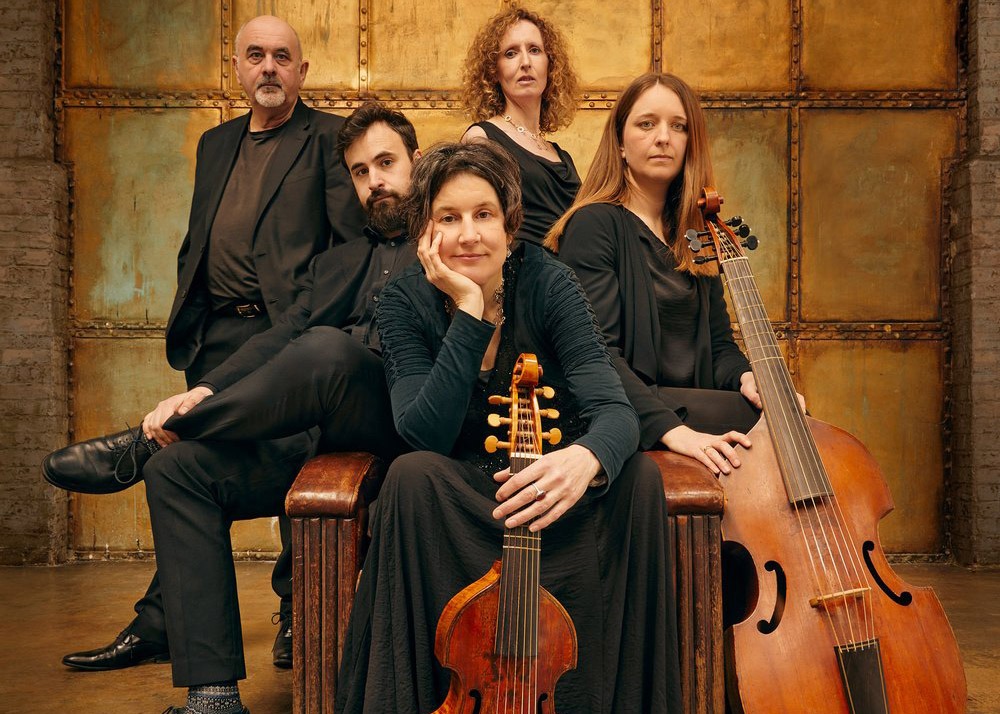Last Wednesday, Fretwork, the world-renowned British viol consort, presented an evening of music by the English Renaissance composer William Byrd and his colleagues Tallis, White and Parsons, as the first concert of this season’s MUSICON concert series. If you’re a fan of early music—put another way, if you know what a viol consort is—you won’t need me to sing the praises of Fretwork, who have been at the cutting edge of this repertoire for almost 40 years. If you’re not already a fan, you might have found this superb concert a perfect way to encounter music that is in some ways modest and low-key, but rich, intricate and deeply satisfying once you get your eye in.
Fretwork consists of five musicians playing different sizes of viols. A viol’s sound is lighter and somewhat thinner than modern orchestral string instruments of the (unrelated) violin family, but it’s incredibly warm as well, particularly when played this well and heard in a space such as Elvet Methodist Church. Early instruments like the viol are notoriously difficult to handle — modern innovations have, by and large, made instruments more user-friendly—but Fretwork made it look effortless. Tuning and blend were remarkable; the way that they phrased each musical line and infuse them with a precise-yet-fluid rhythmic sense was nothing short of miraculous.
The repertoire performed was for the most part based around two popular compositional formats of the era – Fantasias and In nomines. Fantasias, as the name suggests, allow a composer’s imagination the chance to wander freely. The ‘In nomine’ is unique to English consort music and is based around a fragment from a mass by John Taverner in in the early 16th century, which became wildly popular and took on a life of its own.
It could be said that these complex compositional structures don’t offer much memorable melody, in spite of its linear conception. While this may have made the music daunting for the uninitiated, it’s to be expected in music which is more about the way lines interweave. What we had instead of hummable melodies was an incredibly visual type of music, where independent musical lines bobbed, weaved, and intersected with each other in fascinating ways. Many of the pieces on the concert had an air of solemnity, but there were frequent bursts of dance-like energy, rapid passages played with remarkable precision, as well as moments of jagged, thorny harmonies. I would perhaps have appreciated a little more variety to the programming, but that would have sacrificed the sense of focus, the single-mindedness, that made the event so mesmerising. This wasn’t easy music, per se, but those who got on its wavelength were sure to find that it contained deep wells of transcendent beauty.
As stunningly polished as the performances were, I do have one critique. Since many of the pieces on the concert were rather short, the audience was asked to hold their applause until certain places in the programme. While I understand this practice in theory, I find that it can make for an awkward concertgoing experience, and in this case, it contributed to the pieces blending together, particularly during the second half. My suggestion would be to either ask that all applause is held until the interval and the conclusion, or simply allow applause after each piece. Whatever the downsides of these approaches might be, they would alleviate any confusion, which is never a bad thing.
This concert was the first in the new season of MUSICON, Durham University’s professional concert series. I was delighted to see that there was a fine turnout for the concert and that it was well supported by local people, although considering Fretwork’s reputation I was surprised not to see more students in the audience. Concerts like Fretwork’s are a gift, and it’s up to us to take advantage of them.
Chris Massa is a first year PhD student at Durham University. chrismassa.com
If you are passionate about classical music and would like to contribute a review to this site, please email jane@musicdurham.co.uk or if you are a student, please speak to Dr James Weeks in the music department.








